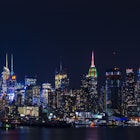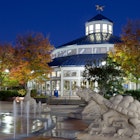
Everyday explorations in Manhattan: New York’s resonant heartbeat
Sep 30, 2019 • 5 min read

New York City has always been a town of firsts, and for centuries, Manhattan has been at the center of invention, creativity and all-around American progress. The nation’s first president was inaugurated here and in 1789, it became the first American capital. In the late 1800s, it was the first city where the then-advance technique of cable-bundling was used to build a suspension bridge. Famously the city of countless advances in civic life, urban planning, arts, and dining, the exciting progress continues at a steady clip today.

Mecca of art and creativity
It’s almost impossible to count the number of styles of music and art that emerged and evolved in New York City’s most famous borough. From the early Vaudeville theaters, Broadway musicals took shape. The soul tunes of the 1960s and 70s gave way to disco and then hip-hop. And don’t forget about punk rock, doo-wop, be-bop and even salsa, a fusion of Cuban and Puerto Rican music. New York City’s always engaging and creative music scenes are, collectively, the dynamic force that gives the city its own unique rhythm, and you can hear it from uptown to downtown. Since 1914, Harlem’s landmark Apollo Theater has been a launching pad for black artists, hosting the debut of Billie Holiday and Sarah Vaughn, and performances by Duke Ellington, Diana Ross, and countless other legends. Ella Fitzgerald was discovered during the theater’s famous amateur night, a weekly event that continues today.
Down the island from Harlem, in the East Village, is the Nuyorican Poets Café, another hotbed for soon-to-be and established poets, hip-hop artists, actors, musicians, and singers, including many of Puerto Rican and Latin descent. At Joe’s Pub, a cafe-style performance space that grew out of the famed Public Theatre, a packed calendar features shows by emerging artists interspersed with known singers and actors. But it’s not only music’s stars of tomorrow who you can catch a glimpse of before they shoot into the spotlight. The legendary Film Forum is a hotbed of indie flicks and more. And the comics who have been part of the troupe at Upright Citizen’s Brigade have landed gigs at Saturday Night Live and starred in popular comic films.

Down the island from Harlem, in the East Village, is the Nuyorican Poets Café, another hotbed for soon-to-be and established poets, hip-hop artists, actors, musicians, and singers, including many of Puerto Rican and Latin descent. At Joe’s Pub, a cafe-style performance space that grew out of the famed Public Theatre, a packed calendar features shows by emerging artists interspersed with known singers and actors. But it’s not only music’s stars of tomorrow who you can catch a glimpse of before they shoot into the spotlight. The legendary Film Forum is a hotbed of indie flicks and more. And the comics who have been part of the troupe at Upright Citizen’s Brigade have landed gigs at Saturday Night Live and starred in popular comic films.
Surprising natural wonders
Yes, Manhattan is a concrete jungle, a vertical city, an urban metropolis that has inspired the design of other cities, but that doesn’t mean there aren’t green sanctuaries to relax, recharge, and take in nature. Central Park, Frederick Law Olmstead’s masterpiece that sprawls across 843 acres, is the city’s most famous oasis, but the famed landscape artist’s other magnum opus is just over half a mile to the west. Stretching nearly 100 blocks along the Hudson River, Riverside Park features playgrounds, jogging trails, historic monuments, and Sakura Park, a cherry-tree-lined path that endures since 1912 when the Committee of Japanese Residents of New York gave a gift of more than 2,000 cherry trees to the city. Green developments continue today, as evidenced by the High Line, a one-and-a-half-mile elevated destination on a former freight line with landscaped grassy spaces, lookout points, public art and more.
But perhaps the most impressive of them all is the New York Botanical Garden, situated on 250 acres across the Harlem River in the Bronx. Opened in 1891, highlights include the landmarked Enid A. Haupt Conservatory, where waterlilies float in a courtyard pool in warmer months, 50 acres of old-growth forest, a tranquil rock garden, community gardens and over one million living plants. Events, including walking tours, happen year-round, but holidays are an especially memorable time to visit, as the site is renowned for its elaborate Holiday Train Show, a model-train wonderland.

Enticing eats
One of the many benefits of Manhattan’s melting pot of residents is its wildly diverse dining scene. Throughout the island’s history, as immigrants arrived they brought their culinary traditions with them and opened restaurants that showcased flavors of home. Italian, Greek, Russian, Middle Eastern and Asian eateries dot the city, some of which endure from days of old, like the Italian red-sauce institution Forlini’s; Chinatown’s oldest restaurant Nom Wah Tea Parlor; the always-packed original P.J. Clarke’s; and the fabled Eastern European deli Russ and Daughters, the fourth-generation-run smoked fish authority where people wait in long lines for the timeless classic: a bagel with a shmear and lox.
The city has always been a destination for fine dining, what with historic steakhouses like Delmonico’s, and modern gastronomy temples like Per Se. Countless chefs who helm high-end kitchens have showcased their talents at the James Beard House. The stately townhouse, the former home of the eponymous celebrated food critic, stands today as the headquarters of the James Beard Foundation, a nonprofit that promotes American culinary heritage, past and present. You can buy tickets online for the dinners they host featuring notable guest chefs from around the US.
Of course, new groups of immigrants arrive and new trends take shape. Food halls have flourished in major cities, for example, and Manhattan is home to many, including the expansive Chelsea Market; Urban Space Vanderbilt, which features outposts from favorite New York City restaurants and cafes; and the Great Northern Food Hall. Danish celebrity chef Kluas Meyer opened this culinary emporium in the majestic Grand Central Terminal to showcase Nordic food. Look for pastries like cinnamon rolls and frosnappers (sweet seeded twists), plus grain bowls, creative smorresbrod, (traditional Danish open-face sandwiches), and Scandinavian beers, then take home a hearty loaf of rye bread for later.
Read more
Everyday explorations in Brooklyn: New York City’s trendsetter
Everyday explorations in Boston: city of innovation
Everyday explorations in Atlanta: cultural capital of the South
Everyday explorations in Los Angeles: city of ceaseless dreams
Produced by Lonely Planet for Ford Motor Company. All editorial views are those of Lonely Planet alone and reflect our policy of editorial independence and impartiality.
Explore related stories









